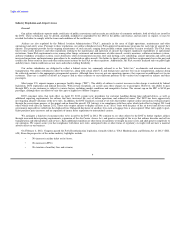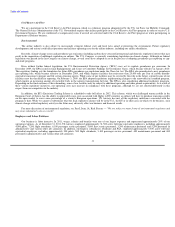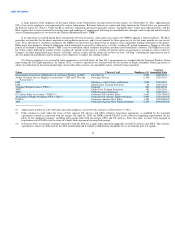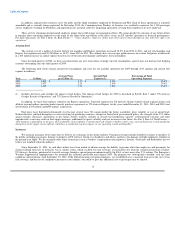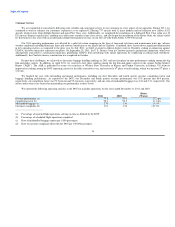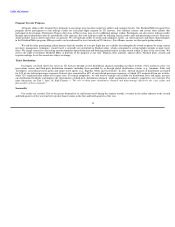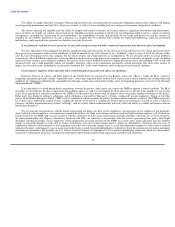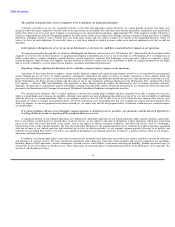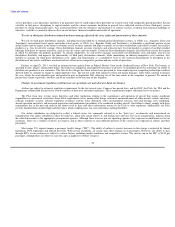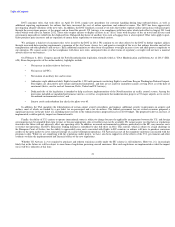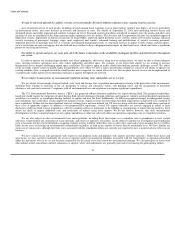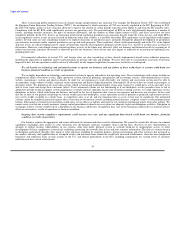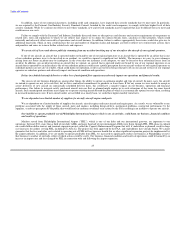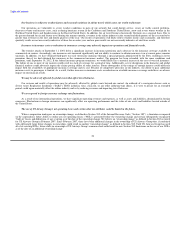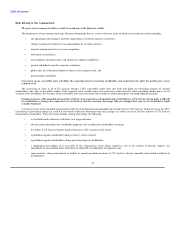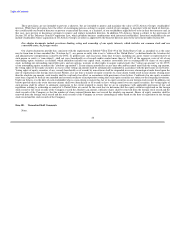US Airways 2011 Annual Report Download - page 21
Download and view the complete annual report
Please find page 21 of the 2011 US Airways annual report below. You can navigate through the pages in the report by either clicking on the pages listed below, or by using the keyword search tool below to find specific information within the annual report.
Table of Contents
Our ability to comply with these covenants while paying the fixed costs associated with our contractual obligations and our other expenses will depend
on our operating performance and cash flow, which are seasonal, as well as factors including fuel costs and general economic and political conditions.
The factors affecting our liquidity (and our ability to comply with related covenants) will remain subject to significant fluctuations and uncertainties,
many of which are outside our control. Any breach of our liquidity covenants or failure to timely pay our obligations could result in a variety of adverse
consequences, including the acceleration of our indebtedness, the withholding of credit card proceeds by our credit card processors and the exercise of
remedies by our creditors and lessors. In such a situation, it is unlikely that we would be able to fulfill our contractual obligations, repay the accelerated
indebtedness, make required lease payments or otherwise cover our fixed costs.
If our financial condition worsens, provisions in our credit card processing and other commercial agreements may adversely affect our liquidity.
We have agreements with companies that process customer credit card transactions for the sale of air travel and other services. These agreements allow
these processing companies, under certain conditions, to hold an amount of our cash (referred to as a "holdback") equal to some or all of the advance ticket
sales that have been processed by that company, but for which we have not yet provided the air transportation. We are currently subject to certain holdback
requirements. These holdback requirements can be modified at the discretion of the processing companies upon the occurrence of specific events, including
material adverse changes in our financial condition. An increase in the current holdback balances to higher percentages up to and including 100% of relevant
advanced ticket sales could materially reduce our liquidity. Likewise, other of our commercial agreements contain provisions that allow other entities to
impose less favorable terms, including the acceleration of amounts due, in the event of material adverse changes in our financial condition.
Union disputes, employee strikes and other labor-related disruptions may adversely affect our operations.
Relations between air carriers and labor unions in the United States are governed by the Railway Labor Act ("RLA"). Under the RLA, collective
bargaining agreements generally contain "amendable dates" rather than expiration dates, and the RLA requires that a carrier maintain the existing terms and
conditions of employment following the amendable date through a multi-stage and usually lengthy series of bargaining processes overseen by the National
Mediation Board ("NMB").
If no agreement is reached during direct negotiations between the parties, either party may request the NMB to appoint a federal mediator. The RLA
prescribes no timetable for the direct negotiation and mediation processes, and it is not unusual for those processes to last for many months or even several
years. If no agreement is reached in mediation, the NMB in its discretion may declare that an impasse exists and proffer binding arbitration to the parties.
Either party may decline to submit to arbitration, and if arbitration is rejected by either party, a 30-day "cooling off" period commences. During or after that
period, a Presidential Emergency Board ("PEB") may be established, which examines the parties' positions and recommends a solution. The PEB process lasts
for 30 days and is followed by another 30-day "cooling off" period. At the end of a "cooling off" period, unless an agreement is reached or action is taken by
Congress, the labor organization may exercise "self-help," such as a strike, which could materially adversely affect our ability to conduct our business and our
financial performance.
We are currently in negotiations with the unions representing our pilots, our fleet service employees, our passenger service employees, our mechanic,
stock clerk and related employees, our maintenance training instructors, our flight crew training instructors and our flight simulator engineers, all of which are
being overseen by the NMB, and we have reached a tentative agreement with the union representing our flight attendants which has not yet been ratified by
the union membership. Our Express subsidiaries, Piedmont and PSA, are currently in negotiations with the unions representing their pilots, their flight
attendants and their passenger service employees, which negotiations are being overseen by the NMB. As a result, these unions presently may not lawfully
engage in concerted refusals to work, such as strikes, slow-downs, sick-outs or other similar activity, against us. Nonetheless, after more than six years of
negotiations without a full resolution to the bargaining issues that arose from the merger, there is a risk that disgruntled employees, either with or without
union involvement, could engage in one or more concerted refusals to work that could individually or collectively harm the operation of our airline and impair
our financial performance. For example, the U.S. District Court in Charlotte on September 28, 2011 granted a preliminary injunction, which was subsequently
converted to a permanent injunction, enjoining the labor union representing our pilots from engaging in an illegal work slowdown.
18



